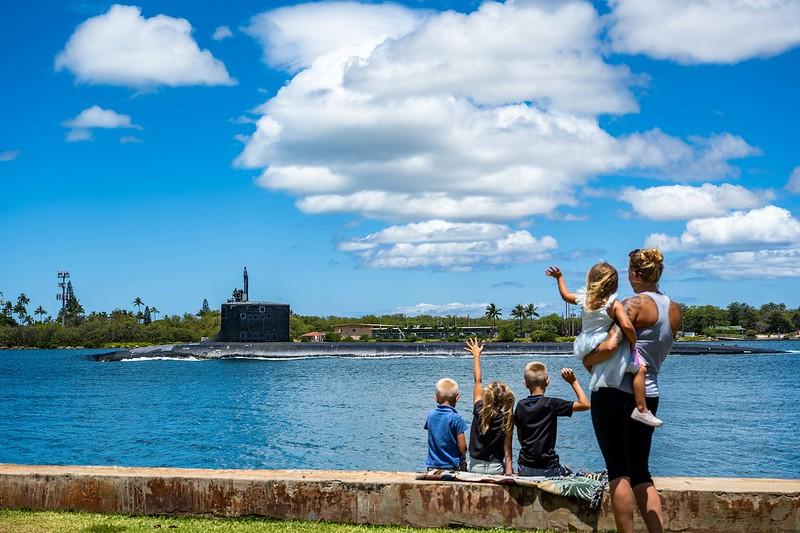
Sea state
Australia will build at least eight nuclear-powered submarines under its new ‘AUKUS’ defence pact with the United Kingdom and the United States. The new submarines will be able to operate for months without surfacing and have greater speed, range and weapons payload than the navy’s current Collins-class submarines.
The nuclear-powered boats will replace the planned 12 diesel–electric submarines in the now-cancelled contract with France’s Naval Group. The troubled $90 billion deal, struck in 2016, had seen cost blowouts and delays. The AUKUS agreement includes unprecedented submarine technology sharing with Australia and provided the Plan B to exit the French deal. In response, France recalled its ambassadors from Washington and Canberra.
Australia is now years behind in obtaining a new submarine fleet, and the lack of a clear construction timeline remains a concern. The government is already considering leasing submarines from the UK or the US to bridge the capability gap when the Collins fleet is retired.
Flight path
At a joint ministerial press conference after the landmark AUKUS announcement, US Defense Secretary Lloyd Austin and Australian Defence Minister Peter Dutton announced that the US would be expanding its military presence in Australia, including increased rotational deployments of personnel and aircraft. Welcoming the enhanced force-posture initiative, Dutton said the two countries would establish combined logistics, sustainment and maintenance capabilities to support the increased activity, possibly exploring basing and ordnance storage options. Austin echoed support for a greater US ‘logistical footprint in Australia’.
On Monday, US Air Force Secretary Frank Kendall disclosed that five test aircraft from the highly classified B-21 Raider stealth bomber program were being assembled at Northrup Grumman’s California manufacturing facility. Kendall said they were ‘making good progress to real fielded capability’. Announced in 2015, the next-generation B-21s will replace the decades-old B-1 and B-2, and possibly the B-52, bombers and will be able to fly conventional and nuclear strike missions. The US Air Force plans to purchase 100 B-21s and wants them in service in the mid-2020s.
Rapid fire
Last week, North Korean state media released images of what it said was the first-ever ballistic missile launch by its Railway Mobile Missile Regiment, reportedly launching two KN-23 missiles into the Sea of Japan from a modified railway boxcar. South Korea responded by testing four new missiles: two air-launched anti-ship cruise missiles, a submarine-launched ballistic missile and a ‘high power’ ballistic missile, possibly the previously unseen supersonic Hyunmoo-4, carrying a two-tonne payload.
The Chinese People’s Liberation Army has reportedly scaled up night drills and high-altitude training in the Himalayas, moving next-generation equipment to the contested India–China border. According to the state media outlet, the PLA Daily, the equipment included the new Type PHL-11 122-millimetre truck-mounted self-propelled rocket launcher system, reportedly used for live-fire precision-strike drills. This is the latest move in a pattern of Chinese PLA deployments to disputed border sites this year despite ongoing talks between the two countries.
Final frontier
Three Chinese astronauts returned to earth following China’s first crewed mission to the Tiangong space station, which is under construction. During the 90-day mission, astronauts conducted two spacewalks, installed a 10-metre mechanical arm and had a discussion on video with President Xi Jinping. There are three more missions planned for 2021–22 to complete construction. China’s space agency has rapidly amped up its activities, launching the Tianwen-1 space probe to Mars and tentatively approving over 1,000 scientific experiments for Tiangong. Once completed, China’s space station will be the only alternative to the ageing International Space Station.
The director of the US National Space Defense Center and Joint Task Force Space Defense, Colonel Scott Brodeur, said the sustainability of activities in space would be considered if the US were to engage in conflict there. Military experts contend that deployment and testing of anti-satellite technology by China and Russia could provoke a US military response. However, space-based conflict would leave vast amounts of the sort of debris that already threatens everyday use of space-based technology. Brodeur said generating space debris during conflict could provoke negative reactions from adversaries and allies alike.
Wired watchtower
New South Wales and Victoria are trialling AI-based facial recognition software that allows police to check if people are at home during mandatory quarantine, even though neither state has disclosed that it’s using this technology. This ‘silent deployment’ comes days after UN Human Rights Commissioner Michele Bachelet warned that such technology posed a ‘catastrophic’ danger to human rights and said Covid-related surveillance creep could erode civil liberties. Reports of police misusing Covid-19 check-in data have added to concerns that measures introduced to fight the pandemic could normalise increased surveillance.
The leaders of the Quad nations will focus on creating secure microchip supply chains when they meet in Washington on Friday, signalling that the alliance is broadening in scope. India has a thriving IT industry but is reliant on Chinese chips and technology, and has been vocal in calling for the Quad to cooperate to strengthen supply networks. The new AUKUS alliance could also be leveraged against ‘hybrid threats’ posed by cyber operations, with ASPI’s Fergus Hanson and Danielle Cave contending that Australia is ‘well placed to turbocharge its strategic tech capability’.